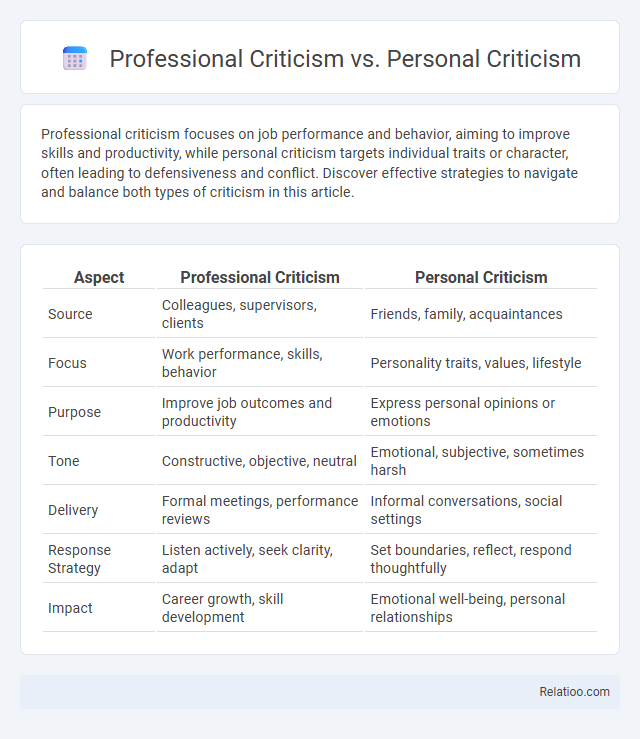Professional criticism focuses on job performance and behavior, aiming to improve skills and productivity, while personal criticism targets individual traits or character, often leading to defensiveness and conflict. Discover effective strategies to navigate and balance both types of criticism in this article.
Table of Comparison
| Aspect | Professional Criticism | Personal Criticism |
|---|---|---|
| Source | Colleagues, supervisors, clients | Friends, family, acquaintances |
| Focus | Work performance, skills, behavior | Personality traits, values, lifestyle |
| Purpose | Improve job outcomes and productivity | Express personal opinions or emotions |
| Tone | Constructive, objective, neutral | Emotional, subjective, sometimes harsh |
| Delivery | Formal meetings, performance reviews | Informal conversations, social settings |
| Response Strategy | Listen actively, seek clarity, adapt | Set boundaries, reflect, respond thoughtfully |
| Impact | Career growth, skill development | Emotional well-being, personal relationships |
Understanding Professional Criticism
Understanding professional criticism involves recognizing feedback aimed at improving performance or work quality without targeting personal attributes. This form of criticism is objective, constructive, and based on specific criteria or standards relevant to your field or task. Differentiating it from personal criticism or polarization helps you respond effectively and maintain focus on growth and improvement.
Defining Personal Criticism
Personal criticism targets an individual's character, motives, or attributes rather than their actions or ideas, often leading to emotional harm and defensiveness. Professional criticism focuses on evaluating work performance or behavior objectively to foster growth and improvement. Understanding this distinction helps you separate constructive feedback from attacks that can polarize opinions and hinder productive dialogue.
Key Differences Between Professional and Personal Criticism
Professional criticism centers on objective evaluation of work or behavior based on standards and facts, aiming to foster growth and improvement. Personal criticism targets an individual's character or attributes, often leading to emotional responses and defensiveness. You can better navigate feedback by distinguishing constructive professional critiques from subjective personal attacks, reducing polarization and promoting productive dialogue.
The Role of Intent in Criticism
The role of intent in professional criticism is to provide constructive feedback aimed at improvement and growth, emphasizing objective evaluation over personal judgment. Personal criticism often involves negative remarks driven by emotions or biases, which can lead to misunderstandings and damage relationships. Polarization intensifies these differences by framing criticism as an attack or defense mechanism, reducing the possibility of productive dialogue and mutual understanding.
Impact on Personal and Professional Growth
Professional criticism centers on constructive feedback aimed at improving skills and performance, fostering Your growth by highlighting areas for development without attacking personal character. Personal criticism, often emotionally charged, can damage self-esteem and hinder motivation, negatively impacting both your personal and professional progress. Polarization, which entrenches opposing views, reduces openness to feedback and collaboration, ultimately stalling growth by creating division and resistance to change.
Common Examples of Each Type
Professional criticism often manifests in performance reviews, offering constructive feedback on work quality or efficiency, such as a manager pointing out missed project deadlines. Personal criticism tends to occur in social interactions, like a friend commenting negatively on someone's habits or appearance, which can affect emotions and self-esteem. Polarization appears in political debates or social media discussions, where opposing groups rigidly defend conflicting beliefs, leading to entrenched divisions and reduced dialogue.
How to Deliver Constructive Professional Criticism
Delivering constructive professional criticism involves focusing on specific behaviors or outcomes rather than personal attributes, ensuring the feedback is objective and actionable. Your approach should emphasize clarity, respect, and a solutions-oriented mindset to foster improvement and collaboration. Avoiding personal attacks and polarization helps maintain a positive work environment where professional growth is prioritized.
Recognizing and Managing Personal Criticism
Recognizing personal criticism involves identifying comments that attack an individual's character rather than addressing specific behaviors or ideas, which often leads to emotional defensiveness and conflict escalation. Managing personal criticism requires maintaining emotional composure, setting clear boundaries, and responding with assertive communication to prevent polarization between parties. Effective strategies include reframing personal attacks into constructive dialogue, seeking clarification, and focusing on objective feedback to foster a healthier interpersonal environment.
Strategies for Responding to Criticism
Effective strategies for responding to professional criticism include actively listening, seeking clarification, and using feedback to improve work quality. When facing personal criticism, maintaining emotional detachment and setting clear boundaries helps in preventing emotional harm and preserving self-esteem. To address polarization, fostering open dialogue, encouraging empathy, and focusing on common goals can reduce division and promote constructive interactions.
Fostering a Positive Criticism Culture
Professional criticism targets specific behaviors or work outcomes and is grounded in constructive feedback aimed at improvement, while personal criticism attacks an individual's character, often leading to defensiveness and resentment. Polarization occurs when opinions become so divided that they hinder open dialogue, creating an environment resistant to growth and collaboration. To foster a positive criticism culture, you must emphasize respectful, objective feedback that encourages learning and mutual understanding, reducing the risk of personal attacks and polarized conflicts.

Infographic: Professional Criticism vs Personal Criticism
 relatioo.com
relatioo.com